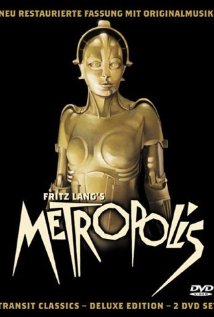German Title: Metropolis
Year: 1926 (first released: early 1927)
Director: Fritz Lang
Screenplay: Thea von Harbou, Fritz Lang (uncredited)
Producer: Erich Pommer
Principal Cast: Alfred Abel (Joh Fredersen), Brigitte Helm (Maria), Gustav Fröhlich (Freder), Rudolf Klein-Rogge (C.A. Rotwang, mad scientist), Fritz Rasp (“Thin Man” personal assistant of the founder, a character rediscovered in lost footage in 2008)
Costume: Ann Wilkomm (sculpture, Walter Schulze Mittendorf)
Note: This article is based on the remastered 2010 re-release that incorporates ~30 minutes of additional footage.
Historical and Artistic Context
Next to (or, perhaps, tied with) Wiene’s Caligari (1920), Fritz Lang’s masterpiece Metropolis (1927) is the most widely-viewed and influential film produced in Germany between the wars. The film, remastered in 2010 to incorporate nearly half an hour of recently rediscovered footage, is a tour de force of late period “silent” film (Gottfried Huppertz’s custom score notwithstanding), and is seen by most scholars as the most significant early science fiction film.
Like Caligari, Metropolis was created between the two world wars. After the extreme economic and political turbulence of the early years of the Weimar Republic, by the mid-20s, Germany had entered a brief few years of relative stability and prosperity, which ended with the US stock market crash of 1929. A major theme within Metropolis is the antagonism between workers and management/owners inherent within capitalism. (Recall that the immediate postwar years had seen one workers’ party-based attempted revolution and subsequent violent divisions between the radical left which favored a Soviet-style, communist state and the far right which wanted an authoritarian oligarchy. Class struggle was not just a theoretical concept within Marxism, it was something that Germans had experienced firsthand.) It was into this crucible that Metropolis suggests a non-violent resolution — a mediator who can negotiate the conflicting interests and needs of the working class and the capitalists.
Synopsis
Metropolis is set in a futuristic city sharply divided between the working class, who live in poor conditions but are the basic force for the city’s work, and the upper class, which is mainly integrated by the city planners and their families. Two persons from each class (Freder and Maria) fall in love. Maria is a working class prophet, a woman who gives hope to the city’s workers by demanding that the heart mediate between the hand and the brain. She predicts the coming of a savior, who will mediate the differences between the social groups and give the city the start of new era. Freder, is the son of the city’s mastermind, Joh Fredersen. Frederson secretly attends the meeting of the workers and entrusts a crazy inventor with the creation of a robot looking exactly like Maria to incite dissatisfaction among the workers. The prophet is, therefore, kidnapped by the inventor, who wants to use her to make a robot work. The robot is given the same physical appearance of the prophet. Following orders from the crazy inventor, the robot creates a lot of problems for the working class. Freder and Maria have to stop the robot and its crazy inventor from creating more problems for Metropolis, and achieve the goal of making the city a harmonious place.
In the meantime, the workers follow the robot’s orders, and destroy the machines, which threaten to drown them and their children. Freder and Maria intervene at the last moment and are able to save the city’s children from total destruction. The workers’ rebellion has taken on dimensions far greater than Freder’s father had ever anticipated. In the final scene, he is shown standing between Freder and Maria, and the workers approach led by their foreman. He follows Freder’s suggestion and shakes hands with the foreman. Subsequently, Maria happily consecrates this symbolic alliance between labor and capital.
Discussion Questions
1) What sorts of association can you make with the film’s title? Why isn’t the name of the city given in the film? Can you think of some alternative titles for the film? What is your justification for choosing these titles?
2) What do you know about Fritz Lang? How did this film fit into his career as a director?
3) How can you relate this film to the time it was made, especially the expressionist movement and the Weimar Republic?
4) What is the role of technology in the film? How is technology used by the upper class to oppress the lower classes?
5) The basic conflict in the film is about class. Why did Fritz Lang decide to portray this conflict using science fiction?
6) How does the class conflict portrayed in the film get resolved? The film has a Marxist orientation, but does not offer a Marxist resolution to the conflict. How is the conflict resolved? How did Marx expect class conflicts to be resolved?
7) How is the film structured? What kinds of elements does a silent film require to convey its message as opposed to a “talkie?” How is the text in the film structured to mimic the structure of society itself? Hint: how is the descending text juxtaposed with the elevator to reinforce the message of the film?
References
“Metropolis (film),” From Wikipedia, the free encyclopedia http://en.wikipedia.org/wiki/Metropolis_(film)
Lotte H. Eisner The Haunted Screen. (Berkeley, Los Angeles, Oxford: University of California Press, 1990). 225
Jack C. Ellis and Virginia Wright Wexman. A History of Film. 5thed. (Boston: Allyn and Bacon, 2002). 53, 64.
Siegfried Kracauer. From Caligari to Hitler: A Psychological History of the German Film (Princeton, New Jersey: Princeton University, 1974). 149.
Synopsis of Metropolis (http://www.imdb.com/title/tt0017136/synopsis)
Siegfried Kracauer, From Caligari to Hitler: A Psychological History of the German Film (Princeton, New Jersey: Princeton University, 1974) 163.
Eike Kronshage, “German Cinema between 1920 to 1930”, The Modernism Lab at Yale University. http://modernism.research.yale.edu/wiki/index.php/German_Cinema_between_1920_and_1930. Web. Accessed September 8, 2011.
Roger Ebert’s commentary on the 2010 remastered release. http://rogerebert.suntimes.com/apps/pbcs.dll/article?AID=/20100602/REVIEWS08/100609989/1023. Web. Accessed September 8, 2011.
Resources
http://www.nytimes.com/2010/05/05/movies/05metropolis.html

